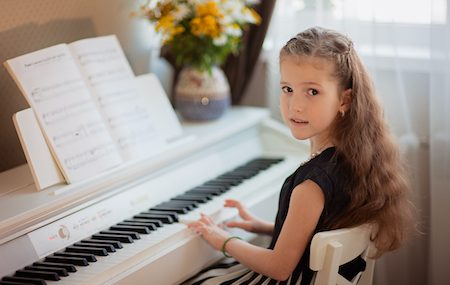For many parents, it’s a fine balance between keeping your child busy after school, and finding activities they truly love. It’s about pushing just enough to give them the chance to fall in love with an activity, while recognizing what they’re really good at.
Setting them up before they begin is half the battle. If you do a few things before your child starts playing the piano, you’ll give them a better chance of falling in love with it.
Buying a piano
This may seem obvious, but a lot of parents get this wrong. They approach it with a “wait and see” mindset, and select a toy piano from a discount store to “test the waters” before investing in something bigger. If you don’t have real equipment, you’ll never learn the right way. Ideally, you should invest in an acoustic piano that can help your child learn things a digital can’t teach. Like how to play using the touch of the keys. And how to capture harmonics by depressing keys and playing others. Touch is essential, something that not all digitals get right.
Put your piano in the right place
Want to know the two biggest reasons children quit the piano? Because the piano is isolated and they don’t want to practice. Or the piano is next to the television, and they can’t practice without interruption. Choose a place that won’t be interrupted by either of these things and you’ll give your child a better chance at success.
Tonal quality
Where did you get your piano from? Was it in your mom’s friend’s great aunt’s next door neighbor’s basement? How long did it sit there? If your child tries to play a song and it sounds nothing like the song, it doesn’t motivate them to keep working. If every note they strike is out of tune, what’s the point? It’s important to enjoy what you do, and you can’t do that unless the piano has a beautiful tonal quality to it.
Introduce the piano before you start lessons
Bringing a piano into your home several months before you start lessons can give the opportunity of having it as a welcome guest. Encourage your kids to sit down and play. Show interest in making music. You can even explore using apps and games to make it more of a challenge. If kids pick up some skills before they attend their first lesson, it can help them stay motivated.
Make sure they are ready
Children need basic skills before you sit them down at the piano. Do they know the difference between right and left? Do they know their alphabet? While the piano may be easy to touch the keys and hear sounds, it is a challenging instrument. It requires a person to use both hands independently, while paying attention to notes on the sheet music. Plus a lot of patience and practical skills mixed in.
Is your child ready to start playing the piano?


